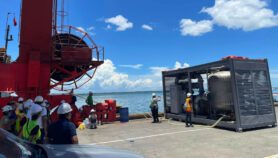By: Paola Di Bella and Giovanni Ortolani
Send to a friend
The details you provide on this page will not be used to send unsolicited email, and will not be sold to a 3rd party. See privacy policy.
Tilapia is a resilient freshwater fish, popular in kitchens across the global South for its low-fat meat, versatility and as a good source of protein.
In the 1980s, researchers at the Asian Institute of Technology (AIT) in Bangkok, Thailand, developed the technology for sex reversal of tilapia seed to produce an all-male fish stock, which grows faster and bigger.
The centre has recently installed wireless sensor network applications at the Aquaculture Lab, a fully-fledged tilapia fish production unit, enabling scientists to collect real-time data on the state of the pond and its fish.
Krishna R. Salin, director of AIT's course in Aquaculture and Aquatic Resources Management, explains that this project is the first step towards developing such wireless technologies for the benefit of local communities across South-East Asia.













